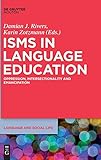Isms in Language Education : Oppression, Intersectionality and Emancipation / ed. by Damian J. Rivers, Karin Zotzmann.
Material type: TextSeries: Language and Social Life [LSL] ; 11Publisher: Berlin ; Boston : De Gruyter Mouton, [2017]Copyright date: ©2017Description: 1 online resource (XII, 270 p.)Content type:
TextSeries: Language and Social Life [LSL] ; 11Publisher: Berlin ; Boston : De Gruyter Mouton, [2017]Copyright date: ©2017Description: 1 online resource (XII, 270 p.)Content type: - 9781501510823
- 9781501502965
- 9781501503085
- 306.44
- online - DeGruyter
- Issued also in print.
| Item type | Current library | Call number | URL | Status | Notes | Barcode | |
|---|---|---|---|---|---|---|---|
 eBook
eBook
|
Biblioteca "Angelicum" Pont. Univ. S.Tommaso d'Aquino Nuvola online | online - DeGruyter (Browse shelf(Opens below)) | Online access | Not for loan (Accesso limitato) | Accesso per gli utenti autorizzati / Access for authorized users | (dgr)9781501503085 |
Frontmatter -- Acknowledgements -- Contents -- Contributors -- Introduction. Bringing the ISMs into focus -- 1. The -isms as interpretive prisms: A pedagogically useful concept -- 2. Intersectionality from a critical realist perspective: A case study of Mexican teachers of English -- 3. Elitism in language learning in the UK -- 4. Native-speakerism and the betrayal of the native speaker language-teaching professional -- 5. Against ethnocentrism and toward translanguaging in literacy and English education -- 6. Cutting across the ideological split of capitalism/communism: Shcherba’s insights on foreign language education -- 7. Methodism versus teacher agency in TESOL -- 8. Academicism in language: “A Shelob’s web that devours and kills from inside” -- 9. Scientism as a linchpin of oppressing isms in language education research -- 10. Languaging and isms of reinforced boundaries across settings: Multidisciplinary ethnographical explorations -- 11. Heterosexism: A pedagogy of homophobic oppression -- 12. Occidental romanticism and English language education -- Index -- Addresses
restricted access online access with authorization star
http://purl.org/coar/access_right/c_16ec
This volume develops a comprehensive understanding of the manner in which dominant/emergent ideologies, discourses and social structures impact language education. The 17 chapters analyze the complex social dynamics of "isms" within language education and detail how such dynamics influence language education pedagogies and practices, institutional policies, intergroup subjectivities in addition to language proficiency achievements.
Issued also in print.
Mode of access: Internet via World Wide Web.
In English.
Description based on online resource; title from PDF title page (publisher's Web site, viewed 25. Jun 2024)


